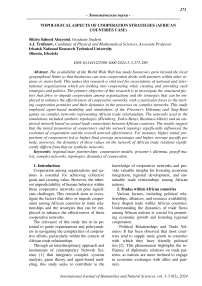Topological aspects of cooperation strategies (African countries case)
Автор: Sikiru S.A., Trufanov A.I.
Журнал: Международный журнал гуманитарных и естественных наук @intjournal
Рубрика: Экономические науки
Статья в выпуске: 5-3 (92), 2024 года.
Бесплатный доступ
The availability of the World Wide Web has made businesses grow beyond the local geographical limits so that businesses can now cooperation deeds with partners within other regions or states both. This makes this research a vital tool for associations of national and international organizations which are looking into cooperating while creating and providing such strategies and politics. The primary objective of this research is to investigate the structural factors that drive or impede cooperation among organizations and the strategies that can be employed to enhance the effectiveness of cooperative networks, with a particular focus to the starting cooperation positions and their dynamics in the processes on complex networks. This study employed agent-based modeling and simulations of the Prisoner's Dilemma and Stag-Hunt games on complex networks representing African trade relationships. The networks used in the simulations included synthetic topologies (Kleinberg, Erdos-Renyi, Barabasi-Albert) and an empirical network based on actual trade connections between African countries. The results suggest that the initial proportion of cooperators and the network topology significantly influenced the evolution of cooperation and the overall network effectiveness. For instance, higher initial proportions of cooperators led to higher final average percentages and higher average payoffs per node, moreover, the dynamics of these values on the network of African trade relations significantly differы from that on synthetic networks.
Regional/state partnerships, cooperation models, prisoner’s dilemma, payoff matrix, complex networks, topologies, dynamics of cooperation
Короткий адрес: https://sciup.org/170205703
IDR: 170205703 | DOI: 10.24412/2500-1000-2024-5-3-273-280
Список литературы Topological aspects of cooperation strategies (African countries case)
- Vespignani A.Twenty years of network science // Nature. - 2018. - V. 558. - P. 528-529. DOI: 10.1038/d41586-018-05444-y
- Geda A., Kebret H. Regional economic integration in Africa: A review of problems and prospects with a case study of COMESA // Journal of African Economies. - 2008. - № 17 (3). - P. 357-394. DOI: 10.1093/jae/ejm021
- Yang Y., Gupta S., Regional trade arrangements in Africa: Past performance and the way forward. // African Development Review. - 2007. - № 19 (3). - P. 399-431. DOI: 10.5465/3069440
- Bouet A., Laborde Debucquet D., Dienesch E., The costs, and benefits of duty-free, quota-free market access for poor countries: Who and what matters // Journal of Globalization and Development. - 2010. - № 3(1). - P. 1-29. - URL: https://www.cgdev.org/sites/default/files/1423986_file_Bouet_et_al_DFQF_FINAL.pdf (Accessed: 23.05.2024).
- Mkandawire P. T., Food insecurity, food prices, and trade: An empirical investigation. // Journal of African Trade. - 2017. - № 4 (1-2). - P. 93-107. DOI: 10.5465/3069440


